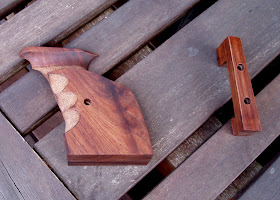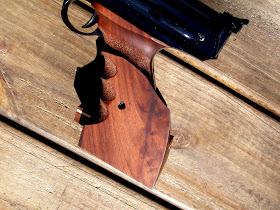
Pushed this pin out.

Came out easily.

Removing the pivot bolt lock screw.

Barrel and breech removed.

Lack of a breech seal...need to make one.

That rivet looks like it won't come out, being flared out at the ends.

But it pushed out easily.

Trigger & spring.

Cocking transfer bar slides forward, up and out.

Trigger pull screw on the right, lock screw on the left.

Mist be missing the plunger/ball on the end?

Disassembled.

Lock screw removed.

The end cap lock screw was missing.

Cap unscrewed.

Just like the other Diana 5.

The piston was stuck so I resorted to this insane solution, my home made slide hammer vise grips holding a bent hook tool...

Which gripped the inside of the piston slot.

Braced in the vise with a piece of brass rod through the pivot holes.

The piston was pulled out.

Unlike any other Diana piston head.

And the head is loose...If anyone has taken apart a similar Diana and has a picture of a good condition piston head like this I'd love to see it. As is I'll probably whip up a replacement dovetailed head that matches the later 5 and solder it in.

You can see the step inside the piston that the head butts up against.
Now to get to work fixing the problems and getting it to shoot.
















































